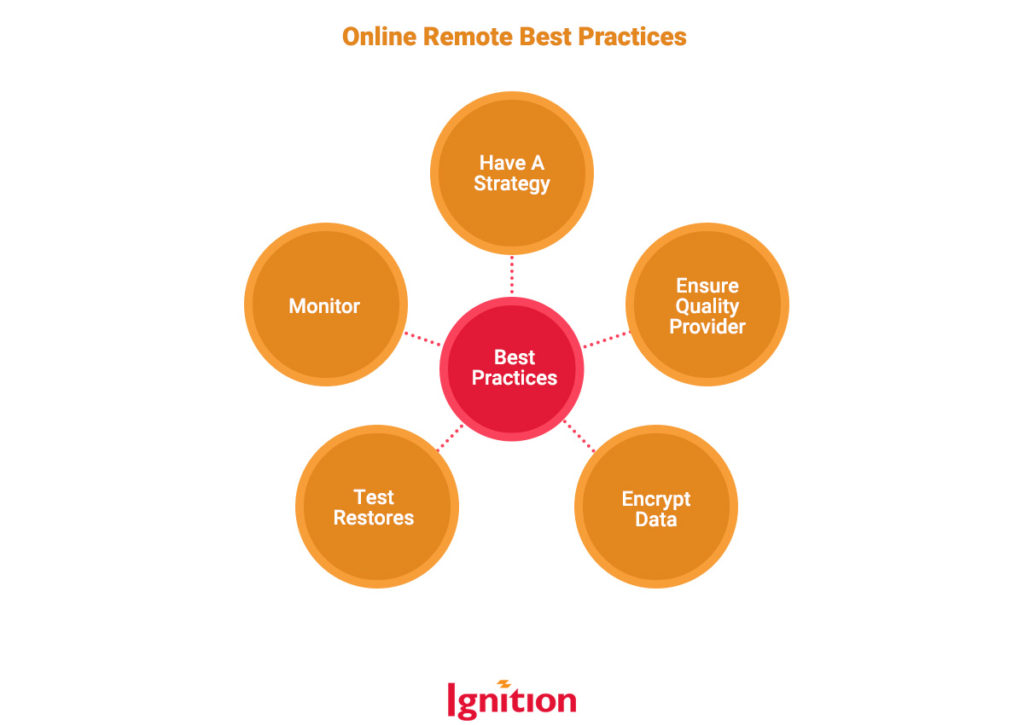You already know that backing up your corporate data makes business sense and common sense. But if you’ve always backed up locally, using an often-frustrating smorgasbord of tapes and drives, you might consider dipping your toe into remote data backup.
What’s Wrong With Local Data Backup?
There’s nothing wrong with local data backup that’s done well. And there are certainly advantages of local back-ups, such as:
- Self-governed Backup: You’re in control, rather than a third party.
- Rapid Data Retrieval: Potentially speedier data recovery time because you have immediate access to your data.
- Offline Reliance: No dependency on a sound internet connection. If there’s an outage, you’ll still have access and the ability to back up the most recent data.
- Cost: If you don’t have much data to back up, you don’t need a lot of storage.
- User-friendly Setup: External hard drives are simple to use, and backup software is usually straightforward to configure with a little IT know-how.
But local backup does have constraints and disadvantages, such as:
- Time and expertise: Manual backups take time and are potentially prone to human error. Even when local backups are automated, monitoring and checking takes time. It’s not always cost-effective in terms of personpower and dollars.
- Not scalable: More data means a lot more effort and time.
- Vulnerable to local hazards: If your office is based in an area prone to disasters such as wildfire, flood, tornados, and rolling blackouts, your backup is at risk. Climate change isn’t going away anytime soon, so risks will get riskier.
Data Backup: Good Practice in Three Steps
It’s always been good practice to create a copy of corporate data and/or systems from your local devices or network and to store it offsite or online. That’s because remote data backup is one-third of the industry-standard 3-2-1 data backup model, which demands three copies of data on two different types of media, one of which must be geographically separated from the original data location.
Remote data backup covers two types of remoteness: offsite and offline. These terms are used interchangeably, but there is a difference. Data backed up offsite is stored geographically distant from the primary data source and can be in physical storage. Online data backup is also geographically distant, but it’s held online in a secure data center or cloud-based data storage infrastructure.
Advantages of Online Remote Data Backup
Using the cloud-based infrastructure to back up your data has several advantages:
| Benefits of Online Remote Data Backup | |
| Protects against local disasters | You’ll still have access to your data if your local data is destroyed or compromised through a natural disaster, e.g., wildfire or flooding. |
| Accessible from anywhere | Data backed up online is accessible by any authorized person securely, wherever they are in the world. This is particularly useful for remote workers or multi-site businesses. |
| Easy to automate | Automating regular and continuous backups keeps backup data current and consistent: no need for humans to remember to do it, and maintains the integrity of the data. |
| Scalable | Server infrastructure at cloud-based storage is quickly and easily expandable and requires less effort than a local installation as extra storage is readily available. |
| Built-in security: | Reputable online backup providers double down on specialist security measures, such as data encryption during the backup process and strong access controls. |
| Cost-effective (sometimes) | Online backup dispenses with the need for local solutions and reduces the burden on your IT people. |
| Flexible recovery | It’s straightforward to recover all your data or drill down to particular files or versions. |
| Cloud-to-cloud backups | Easy, specialist backups for businesses already working in the cloud, e.g., through Slack or Salesforce. |
Remote Data Backup: Best Practices in Action
Online remote data backup sounds less work than doing it all yourself locally. But just because you’re trusting a backup service provider to do the hard work for you, it’s not something you can set and forget. Here are five of our favorite best practices to consider:

Have a Backup Strategy
What data should you back up, and how often? Do you have historical data you need to keep but not back up? What should be the retention period for each type of data? How will you choose a backup service provider? Should you back up your systems, too? How often should you test restores, and who’s responsible for monitoring? These are just a few of the questions your backup strategy should address.
Get A Quality Provider
Here’s where you shop around. It’s important to choose a provider with an excellent track record, decent customer service, and clarity about the levels of security and service they’ll provide. Don’t forget to check what they’ll charge should you need to scale up the volume of data backed up. More data, more cost.
Encrypt Backup Data
Data that’s traveling between source and destination is at its most vulnerable to unauthorized access. Encrypting data as it travels is the solution. Ensure that your backup service provider keeps data encrypted during storage, and ensure that your data is encrypted as it starts the journey from your local files.
Test Restores Regularly
The whole point of data backup is to enable its restoration should something happen to the original, but it’s not a good idea to test how quickly or completely your data can be restored only when a real emergency has happened. Set a schedule for testing data recovery and restoration so that you can be confident that if your data collapses, your business won’t.
Monitor, Monitor, Monitor
Tempting as it is to let your service provider get on with it, it’s best practice to ensure that things are happening as they should. You’ll learn useful stuff like: do you have enough (or too much) storage? What’s the backup failure rate? (We hope for zero.) Are backups running as frequently as you need? How granular is your data versioning?
Remote Data Backup Curious? Ask Us Anything
One thing not mentioned much about online remote data backup is the peace of mind aspect, especially for small businesses, startups, and other organizations that may not have an IT team to rely on. Knowing that your business data will always be available, no matter what happens, reduces your blood pressure right there. Our data backup expert is always available for a no-obligation chat about what online setup might be right for your business. Call us because we’re here to help.
Ignition is Silicon Valley’s best (and friendliest) IT security, compliance, and support team. Contact us now – chatting about IT support and cybersecurity is our favorite thing to do!

